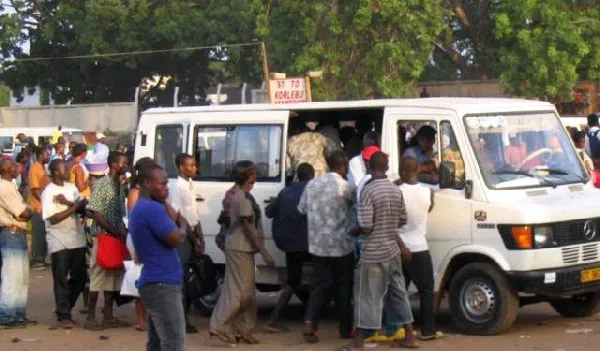Editorial
Provide more buses for easy commuting

The bad nature of the Kasoa road
Dear Editor,
I am writing to bring to the attention of the concerned authorities, a pressing issue that affects our community: the lack of adequate public transportation.
As a daily commuter, I have witnessed lots of people experience firsthand the frustration and inconvenience of unreliable and infrequent bus services.
The current public transportation system is inadequate, with long waiting times, inadequate buses, and limited routes.
People are always spotted at some of the stations at Kwame Nkrumah interchange (Circle), forming long queues waiting for a bus to either board to go to work or home after a stressful day at work.
This sometimes results in absenteeism from work because one would not get a car home on time; that may lead to decrease in productivity.
Moreover, it excessively affects low-income residents who rely heavily on public transportation before going to work.
However, these long queues often seen at the stations are partly the fault of drivers who refuse to go to a particular destination due to the bad nature of the roads leading to these destinations.
Some also refuse going to a destination because they want to avoid traffic.
I would appreciate if the government look into poor roads and fix them so that drivers can safely transport individuals to their destinations.
I believe that by working together, we can create a more sustainable, equitable, and connected community.
Elizabeth Agyeibea Ackon,
Accra.
Editorial
Parents urged to take responsibility for sex education
Dr. Francis Wuobar, a Gynaecologist at the Eastern Regional Hospital in Koforidua has urged parents to take the lead in providing sex education to their children, stressing that they were in the best position to guide them through the changes of adolescence.
According to him, sex education remained a taboo subject in most Ghanaian homes, a culture that must change to prevent children from seeking misleading information elsewhere.
“With the evolving nature of society and technological advancements, today’s children will either learn about sex on the internet or from their peers, who may offer wrong advice,” he cautioned.
Dr. Wuobar noted that the health system and society often concentrate on the reproductive stage of life, neglecting the adolescent and menopausal phases.
“When a woman reaches the reproductive period and gets pregnant, everyone rallies around her. But before that stage, during adolescence, there is little attention and guidance, which has contributed to the rising cases of teenage pregnancy,” he explained.
He observed that many adolescents lack access to counseling and adolescent clinics, creating a vacuum that forces them to explore on their own.
“The answers they seek, adults and parents are not willing to provide. Their peers, who are equally uninformed, become their only source of advice. This exploration is one of the major contributors to teenage pregnancy,” he said.
Dr. Wuobar therefore called on parents to create open and confidential spaces for discussion, where children can freely ask questions about sex, puberty, and relationships.
He emphasized that parents must help adolescents understand the consequences of unprotected sex, the changes they go through, and what choices were right or wrong.
“Today’s generation is curious and asks questions, unlike in the past when children were silent. Parents should not rebuke them but rather engage them seriously and guide them through this turbulent stage,” he advised.
He further appealed to the health sector to establish more adolescent clinics across the country to give young people safe spaces to seek information and counseling.
That, he said, would help reduce the high incidence of teenage pregnancy and support adolescents in making informed decisions about their sexual health.
From Ama Tekyiwaa Ampadu Agyeman, Koforidua
Editorial
Addressing unhealthy conditions at Akropong Mandela Market

Dear Editor,
The Akropong Mandela Market, a vibrant centre of commerce, has been in a terrible state for over a decade now.
Central to the problem is a public toilet located near the market, which has become a breeding ground for diseases and a source of discomfort for both food vendors and customers.
This toilet, utilised by everyone in the town, is positioned too close to the market, severely affecting the vendors who spend long hours selling their goods.
They are constantly exposed to unsanitary conditions mixed with foul odours emanating from the facility.
Agnes, a vendor at the market is sad about the apparent lack of concern from those responsible for maintaining the toilet. Despite collecting user fees, there seems to be little effort to keep the facility clean and hygienic.
The situation at the Akropong Mandela Market highlights the urgent need for effective waste management and sanitation infrastructure in public spaces.
Authorities must take immediate action to ensure the facility is regularly maintained and cleaned. Vendors and customers deserve a safe and healthy environment to conduct their daily activities.
In the meantime, the vendors are urging local government officials to intervene and find a lasting solution to this problem.
Only through collective action can the health and well-being of both vendors and customers be safeguarded to restore the Akropong Mandela Market to its former glory as a thriving commercial hub.
Addo Sarah Ansah Student,
UNIMAC–IJ(BACS26275)
Join our WhatsApp Channel now!
https://whatsapp.com/channel/0029VbBElzjInlqHhl1aTU27






